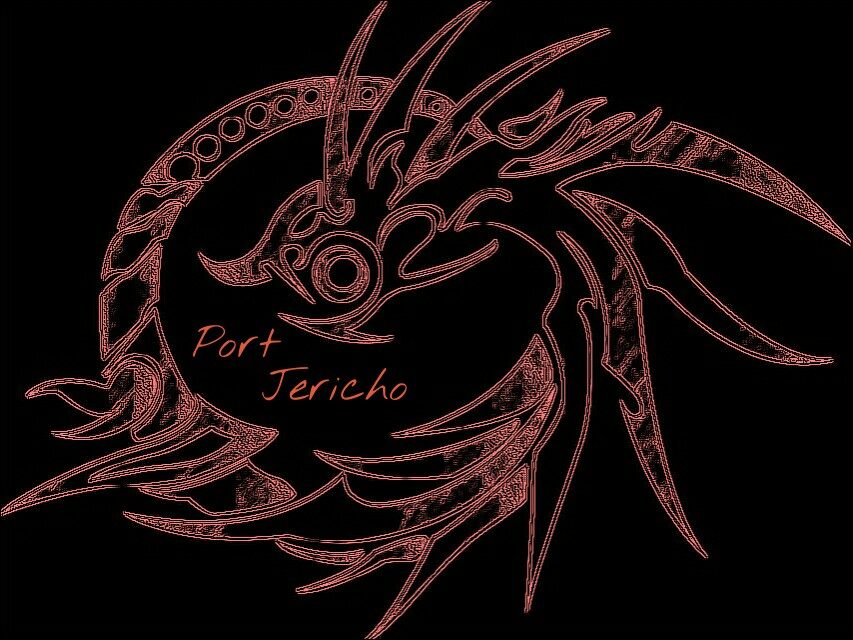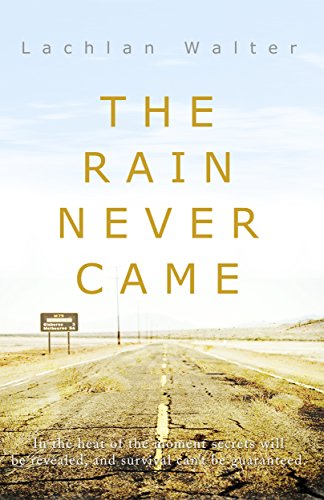**This book was reviewed by independent request
The Rain Never Came, by Lachlan Walter, is the story of two friends living in a desolate, sun-scorched Australia, where it hasn’t rained properly for decades. War further decimated and desecrated the land. Tobe, a transient scavenger, has come home to his little nameless town and meets up with his mate Bill at a impromptu ballgame happening between the locals, and a First Country team.
Bill and Tobe catch up on old times during the duration of the game, and Tobe shares the too-good-to-be-true news that he spotted real rain recently, that the rainstorms had trailed him all the way back home. In the aftermath of the game, the tale spreads, injecting hope into the celebratory party afterwards. As the night goes on, we get to meet many of the townsfolk in depth, through Bill’s interactions. At one point, excitement is stirred up when what appears to be a kicker of a thunderstorm is heard, close enough to shake the ground, accompanied by bright flashes. Unfortunately, it moves on without delivering on the promise of rain.
In the wake of disappointment, Bill and Tobe end up leaving on a ‘road trip’, an attempt to find what caused the lights, which were apparently not lightning. What they find, on reaching the Borough, the nearest big town, is an utter massacre. It doesn’t seem to have been the cause of the lights though. Tobe reckons it happened a few days prior. It looks to be that Creeps attacked the Borough, and got a fierce battle. Fearing retaliation from the Creeps against neighboring towns and villages, the pair head home to give warning. No-one wants to listen though. Disgusted Tobe and Bill leave again, bringing with them Ruby, a young girl found in the wilds. A search for safety ends in the Creeps’ Camp, where tensions come to a head and numerous secrets are revealed.
This is a story full of the rich humour peculiar to Australians. As with British humour, some might escape American readers, or feel odd. It’s a tale of contrasts. Happiness and sadness, beauty and harshness, levity and seriousness.
Overall, the story is good. It held my attention. I’m all about man against nature, which much of this story was. But I have questions, son. Why do Tobe and Bill abandon food and supplies before going through the metal maze, when food and water are uncertainties in this land. For that matter, why are they travelling by foot during the grueling heat of day? In Australia?! And where are they keeping all the water that would be necessary for themselves and the dogs? Only canteens are mentioned, but they’d have needed dozens. Perhaps I am misjudging distance travelled, though.
While this is a dystopia, it isn’t like most I’ve read. For a good chunk of story, we are wandering the desolation. There is mention of the Creeps, and we see evidence of their presence, but it’s not til the latter ⅓ that we come into full contact. I’m interested to know more about the war, though it seems as far past as the last big rains are. Now is about survival in a nearly inhospitable climate. But was it the climate that precipitated the war? Are they unrelated?
Descriptions in Rain were first-rate. I felt the scrub desert, and the sweltering heat (thanks, mate. I loathe heat 😆) When Bill has his ‘accident’, after opening the transport door, that tumult of chaotic motion, and the sensations and noise of waking while traveling in a car, but not fully aware of the fact, I was there. It was terrifying. And the bridge collapse! Great attention to detail!
I enjoyed the suspense of the story. There was always something we were being teased with learning. What happened to Bill’s family? Who’s in the mystery grave he tends? Why does Tobe feel he owes Bill? Where did Ruby come from? Who are the Creeps, and why are they called that? The characters felt real, and relatable. As much as I’d like to think I could be like Tobe, I’d be more like Bill. At first, it seemed like Bill was a big liability out in the bush, and I wondered why Tobe wanted him along. He was clumsy and prone to injury, partly in thanks to impaired vision. I so grok that. Yet, at times, he certainly had more sense than Tobe. Bill is the one who noticed the lack of flies. That was a very important clue.
There is a bit of a ‘Mad Max’ feel, especially once we reach the Relocation Camp. Walter is Australian, so I liked the homage paid to this cult classic series set in Australia. I greatly enjoyed how Walter’s culture came through, not just with colloquial language, but its essence also. Tenacity is valued, and reflected, as is fierce independence, and it’s a different sort of independence than American culture has. As with many other cultural traits, a certain notion of not being full of oneself was imported from the British parent culture, and wicked sharp humour is used to deflate puffed egos. Living in a harsher environment also seems to have fostered a sensibility and acceptance of what is. I know it’s the anthropologist in me, but I love reading books that are translated, (or in this case, written by an author who speaks a different variation of English), because cultural influences shine through in nuance that cannot be achieved by an Outsider writing the same story. Oh, and the indigenous Aborigines are mentioned often, as First Country people. I really liked that detail.
📚📚📚📚


